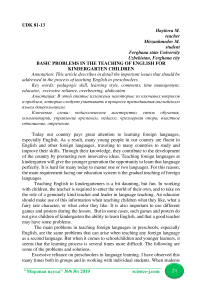Basic problems in the teaching of English for kindergarten children
Автор: Hayitova M., Mirzaahmedov M.
Журнал: Мировая наука @science-j
Рубрика: Основной раздел
Статья в выпуске: 9 (30), 2019 года.
Бесплатный доступ
This article describes in detail the important issues that should be addressed in the process of teaching English to preschoolers.
Pedagogic skill, learning style, comments, time management, educator, excessive reliance, overbearing, abdication
Короткий адрес: https://sciup.org/140264892
IDR: 140264892 | УДК: 81-13
Текст научной статьи Basic problems in the teaching of English for kindergarten children
Today our country pays great attention to learning foreign languages,
especially English. As a result, many young people in our country are fluent in English and other foreign languages, traveling to many countries to study and improve their skills. Through their knowledge, they contribute to the development of the country by promoting new innovative ideas. Teaching foreign languages at kindergarten will give the younger generation the opportunity to learn that language perfectly. It is hard for many today to master one or two languages. For this reason, the main requirement facing our education system is the gradual teaching of foreign languages.
Teaching English to kindergarteners is a bit daunting, but fun. In working with children, the teacher is required to enter the world of their own, and to take on the role of a genuinely kind teacher and leader in language teaching. An educator should make use of this information when teaching children what they like, what a fairy tale character, or what color they like. It is also important to use different games and posters during the lesson. But in some cases, such games and posters do not give children of kindergarten the ability to learn English, and that a good teacher may have some problems.
The main problems in teaching foreign languages in preschools, especially English, are the same problems that can arise when teaching any foreign language as a second language. But when it comes to schoolchildren and younger learners, it seems that the learning process is several times more difficult. The following are some of the problems and solutions.
Excessive reliance on preschoolers in language learning. I have observed this many times both in groups and in working with individual students. When students

do not know the correct answers to some questions, they are silent and expect the teacher to give the correct answer. Maybe it's related to the child's psychology of learning. But in these cases, it seems to me that the educator is more likely to encourage a kindergarten child to think independently, even if it is using a book or notebook. One of our next problems is the use of the native language. It is not possible to teach a foreign language in a foreign language. It may be possible to teach high school classes, especially with alumni, but I think it is impossible for young students to learn English without using Uzbek. However, excessive use of the first language (mother tongue) can also have a major impact on students' learning a foreign language. In groups, English teacher must balance between teaching English and Uzbek when teaching English. But how do you find that standard? If you speak a lot of Uzbek, but it seems that English is not being taught enough. On the contrary, it is often said in English that when students do not understand what is being said, they may not fully understand some of the tasks. In any case, the problem with the standard of language use in the classes between the native language and the English language, in my opinion, is that many teachers think. Noisy, overbearing, interrupting students. Despite the fact that such learners are a failure of any course, the English teacher is blamed for the lack of such equipment in the first place, and secondly, the lack of sufficient equipment for the student. We may explain the presence of such students in Uzbek language, such as history and geography, as "a child is not interested in science," but not in English. In order for a child to be interested in a subject in English, he must understand the subject, even if he is interested in it. It is important that the explanation should be based not only on verbal information but also on visual aids and multimedia tools. The course is designed to engage students in foreign languages, to present as little information as possible, to enrich the course with colorful drawings, drawings, and multimedia tools that help students deliver information even when they are not familiar with the language. is required.
In addition, the teacher should be able to explain to the children unintentionally in the process of learning the language, to enter their world, and to think as they do. If the teacher lacks pedagogical skills, it can have serious negative effects on language teaching. This can lead to children's poor understanding of the language.
Preschoolers' playfulness and "abdication" of the lesson. This issue is different from the previous one. Examples of students 'abduction' are the following: topicbased conversations start, students engage in conversation, topic-based discussions are ongoing, and students try to speak English fluently. While everything seems to be going well, readers accidentally, sometimes unknowingly, talk about something quite similar, but completely different. This is considered to be broader thinking and more information, but is a departure from the subject, and may lead to the reader being completely distracted from the main topic. In this process, the educator must guide the children in the right direction, talk about other things without boring them, and work with different pictures and posters. This will help children to avoid playfulness and increase their interest in the topic being taught. The next problem is widespread among children of kindergarten. These are widespread discussions and debates among children. Sometimes this can happen to all children. Sometimes in a friendly environment, controversy can also lead to unexpected controversies and negative scandals. Although this happens not only in English classes but also in any other subject, it may also be because students are not interested or not understanding the subject. Each teacher should try to follow the advice given in Problems 3 above to avoid such adverse circumstances.
Inadequate understanding of the questions and science of kindergarten teachers. In English lessons, it is advisable that all the tasks be given in English, with the exception of the use of native language. But what if students do not have enough understanding of English language assignments? In order to be clear, the teacher should also try to visualize the task for the reader based on the movements of the hands, facial features, and special motion symbols. Verbal + visual expression is always twice as good. In addition, children of kindergarten do not have sufficient mental capacity yet. For this reason, children can have a much more positive impact on hand movements, games and visual aids.
Pupils get bored. In the boring lessons, it is natural for students to get bored, regardless of their age. In order to make the lessons more interesting, the teachers should talk to each student in the classroom and learn about the personal interests of the class members, and then move on to explain the topic, taking into account the overall interest of the class. We know that children get tired quickly in the learning process, but their physical abilities are much better at this time. For this reason, language teaching through exercise games is much more effective than theoretical knowledge. Constant priority over one or more active children. This should not be allowed in English lessons, which should always be a constant contact of the supervisors and that the latter will always remain second to none. Everyone should participate in English classes and learn equally.
Failure to fulfill the homework in kindergarten. The first reason for this is that the instructor is not sufficiently attentive to the task of the lesson. If a teacher spends a specified portion of the lesson only for examining assignments based on the assigned subject, and no student is left out, the classroom attendance will increase significantly. The second reason for missing out on classes might be because students do not come home to work because they do not understand. To avoid this, at the end of each lesson, the teacher clearly explains the task at home, make sure that each student understands, and, if necessary, do the homework properly by working with students individually.
Missing a lesson. Late or absenteeism should be explained to the students that, in addition to being a teacher and a lack of respect for the lesson, it can also distract the students from their comments and interrupt the lesson. Parents of children of kindergarten do not always let their children go to kindergarten. Delaying rules should be included in the "English Lesson Rules" in order to encourage regular students and to reduce the number of delays in future classes. If necessary, leniency measures should be established for both delayed and regular students. The success of each lesson depends on the teacher. Collaboration between teacher and student plays an important role in solving almost all of the 10 most common problems in the example above. The language teaching process for kindergarten-age children is very difficult and at the same time very enjoyable. When a teacher is able to fully reflect his / her skills, he / she will achieve the goal. Therefore, it is important for a successful teacher not only to become a mentor, but also to have friends with them.
Every children must feel safe and important in the class in order for maximum learning to take place. A positive classroom environment does not just happen; the teachers create it. Becoming an effective teacher takes time, hard work, and dedication; we can have a long way to go in creating a better learning environment for learners. Once we realize its importance and continuously try something new when faced with issues, things will change.
Список литературы Basic problems in the teaching of English for kindergarten children
- Schmith P.A. Working with children effectively. - Cardinall press., 2017
- Joan Kang Shin, Teaching English to young learners, University of Maryland, Baltimore country.
- Fiona L. Cooper (2007), Fun English for kids, Asuncion, Paraguay
- Juraeva R.T. Pedagogic methods for youngsters. - Toshkent., 2013


